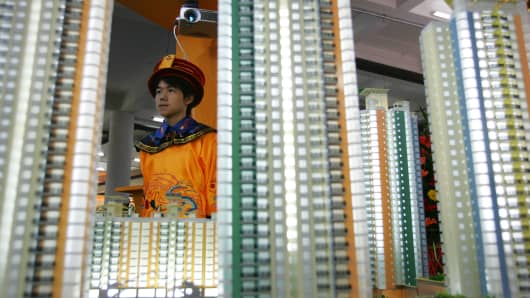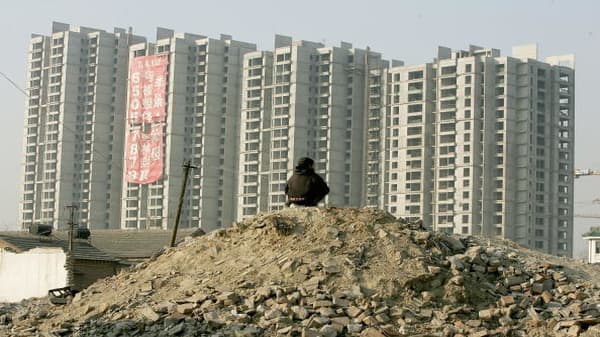Chinese high-yield property bonds, a popular trade that lured investors over the past year given their attractive returns, are now fast falling out of favor.
The average yield on China property bonds has risen to 9.3 percent as of end-June, after hitting all-time lows of just under 7 percent on May 10, according to Deustche Bank, which tracks 80 U.S. dollar denominated bonds in the sector, most of which are non-investment grade. The average yield currently stands at 8.8 percent.
The bonds have taken a hit from both concerns over the U.S. Federal Reserve tapering its bond buying program, which has dampened appetite for riskier assets, alongside worries over a liquidity crunch in the world's second largest economy.
"Chinese property bonds were underperformers relative to other high yield sectors, with longer dated paper leading the sell-off," Jacphanie Cheung, director of Asia Credit Research at Deutsche Bank, told CNBC.
(Read More: Junk Bonds Suddenly Don't Look So Good Anymore)
For example, the yield on Shenzhen-based Kaisa Group Holdings' bond which matures in 2020 - one of the worst performers amid the sell-off - has risen from 7.4 percent in May to 12.4 percent currently, according to an analyst familiar with the space.
Eddie Tam, chief executive of Hong Kong-based hedge fund Central Asset Investments, who just one year ago identified Chinese high yield property bonds as stellar opportunities , said he has slashed his exposure to the sector in recent months.
"In the last 2-3 months, bond yields have rebounded due to renewed macro concerns about China: the growth slowdown as well as the recent SHIBOR [Shanghai Interbank Offered Rate] scare," he added, referring to the spike in Chinese interbank lending rates in mid-June, when the 7-day repo rate jumped to above 10 percent, far above the average of 3-4 percent seen in the past year.
"We have been taking profits in our bond portfolio, so we now only have very little exposure to the Chinese property sector bonds," Tam said.
Investors are particularly trimming their exposure to bonds with lower credit ratings among the high yield space, said market watchers.
"It is the lowest quality end of the spectrum where I'd be much more concerned, regardless of whether these are developers. The risk here is one of tight credit, and the weakest borrowers are most at risk," said Manpreet Gill, fixed income strategist at Standard Chartered Bank.
Worst Hit
"During the correction, investors who had bought bonds earlier this year would have been affected as the bonds were issued at lower yields," said Jacphanie Cheung, director of Asia Credit Research at Deutsche Bank.
Asset managers and private banks have made up the bulk of demand for high yield debt in Asia, accounting for 62 and 25 percent, respectively, of this year's new deals, according to CreditSights.
Many private banks use leverage to boost their returns, thus a steep drop in bond prices, could trigger margin calls and a downward price spiral, said a strategist at the research provider.
Outlook Grim
Cheung of Deutsche Bank expects Chinese property bond yields to continue to rise over the second-half.
"Chinese banks may turn more cautious on lending to the property sector for the rest of the year after exceptionally high lending to the sector in the first quarter," she said.





